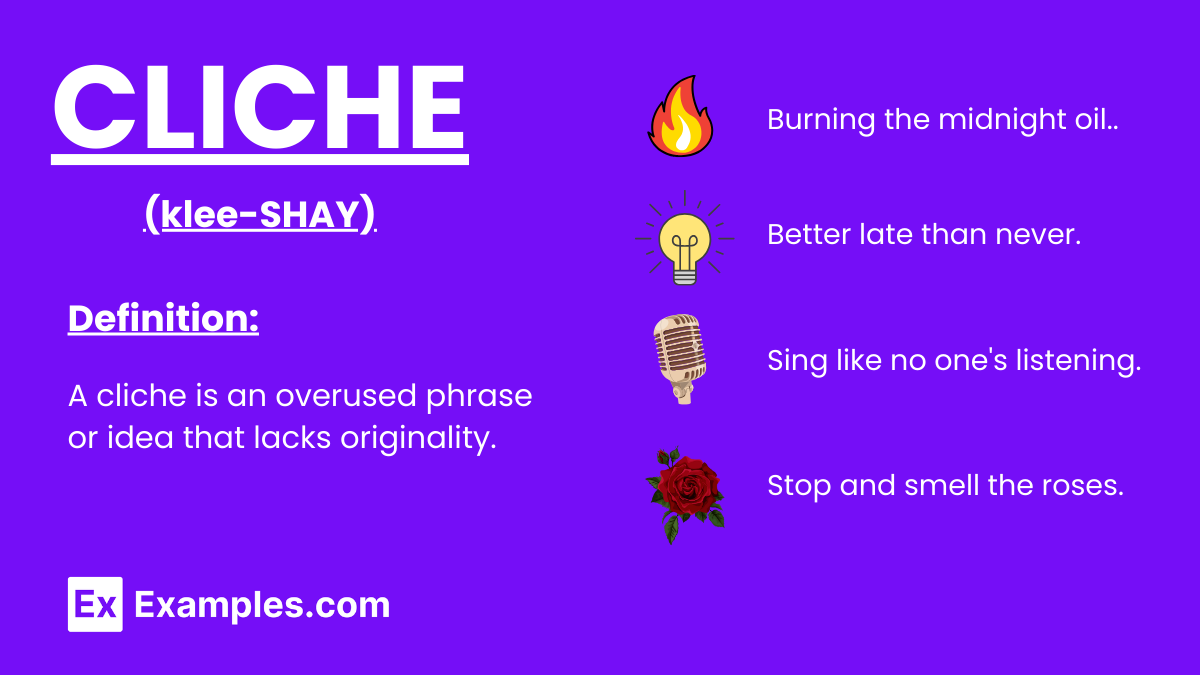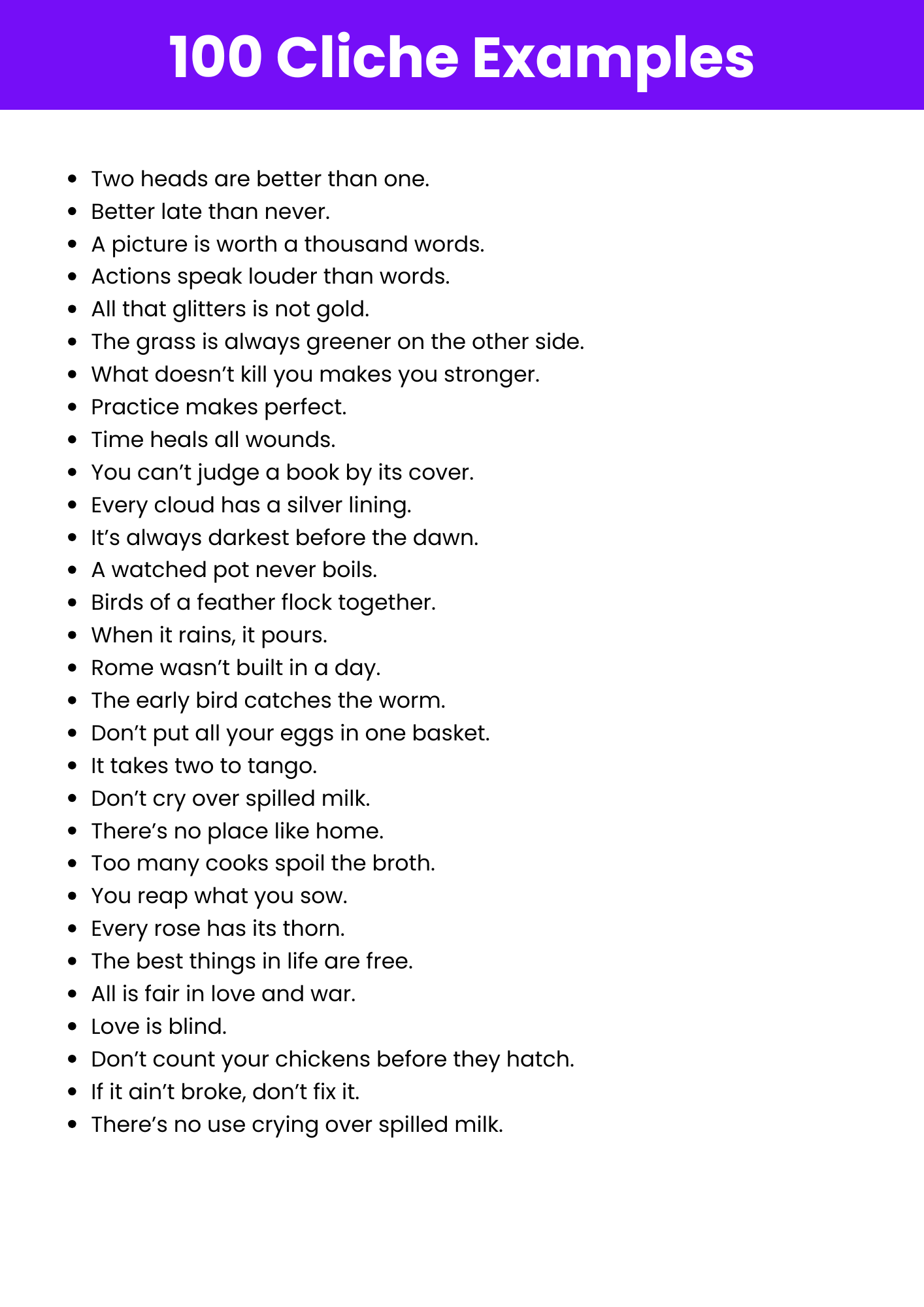Cliche
What is Cliche? – Definition
A cliche is an overused expression, idea, or phrase that has lost its originality and impact due to excessive repetition, often seen as unoriginal or predictable.

Generated Cliche Examples

Examples of Cliche
- Love conquers all.
- Every cloud has a silver lining.
- Time heals all wounds.
- What goes around comes around.
- The calm before the storm.
- Actions speak louder than words.
- Better late than never.
- Only time will tell.
- Beauty is in the eye of the beholder.
- The grass is always greener on the other side.
- You can’t judge a book by its cover.
- Every rose has its thorn.
- Lightning never strikes the same place twice.
- What doesn’t kill you makes you stronger.
- Absence makes the heart grow fonder.
- Birds of a feather flock together.
- When it rains, it pours.
- Practice makes perfect.
- Ignorance is bliss.
- Haste makes waste.
- Laughter is the best medicine.
- Two heads are better than one.
- A penny saved is a penny earned.
- Rome wasn’t built in a day.
- Slow and steady wins the race.
- Better safe than sorry.
- A stitch in time saves nine.
- The early bird catches the worm.
- Don’t bite off more than you can chew.
- When the going gets tough, the tough get going.
Types of Cliches
Romantic Cliches
Overused phrases and ideas often found in love stories or relationships.
- “Love is blind.”
- “You complete me.”
- “Absence makes the heart grow fonder.”
- “You’re the one.”
- “Together forever.”
Motivational Cliches
Overused phrases meant to inspire or encourage.
- “Keep your chin up.”
- “When the going gets tough, the tough get going.”
- “Reach for the stars.”
- “Winners never quit, and quitters never win.”
- “Every cloud has a silver lining.”
Life Cliches
Common expressions about life’s experiences or truths.
- “What goes around, comes around.”
- “Everything happens for a reason.”
- “Live and let live.”
- “Time heals all wounds.”
- “Life is what you make it.”
Workplace Cliches
Overused phrases and expressions often heard in professional environments.
- “Let’s take this offline.”
- “We’re on the same page.”
- “It’s not rocket science.”
- “Let’s think outside the box.”
- “It is what it is.”
Weather Cliches
Cliches used to describe weather and its effects.
- “It’s a perfect storm.”
- “Storm in a teacup.”
- “Snowed under.”
- “A ray of sunshine.”
- “As right as rain.”
Sports Cliches
Commonly used expressions from sports often applied to everyday life.
- “Give it 110%.”
- “It’s not over until it’s over.”
- “Step up to the plate.”
- “Take one for the team.”
- “The ball is in your court.”
How to Identify a Cliche?
To identify a cliché, look for phrases, ideas, or expressions that are overly familiar, predictable, or overused. Cliches often lack originality and may fail to evoke a strong emotional response due to their repetition.
- Check if the phrase or idea feels predictable or unoriginal.
- Notice if the expression has been used repeatedly in similar contexts.
- Analyze whether the phrase fails to add depth or new insight to the content.
- Compare the phrase with more specific, vivid, or fresh alternatives.
- Identify if the phrase seems to rely on stereotypes or generalizations.
How to Avoid Using Cliches?
Avoiding clichés involves thinking creatively and using original, specific language that conveys your message more effectively. Replace overused phrases with unique expressions that resonate with your audience.
- Replace clichés with fresh, vivid descriptions tailored to your narrative.
- Think deeply about the emotions or ideas you want to convey and express them uniquely.
- Experiment with metaphors or similes that offer a fresh perspective.
- Research alternative phrases or words to convey your message effectively.
- Focus on specific, personal, or unique details to add depth and authenticity.
Other Cliche Examples
Cliches in Love
Overused expressions related to romance and affection.
- Love is blind.
- My heart skipped a beat.
- The love of my life.
- Head over heels in love.
- Love conquers all.
Cliches in Work
Common sayings used in professional or workplace settings.
- Think outside the box.
- Time is money.
- Teamwork makes the dream work.
- Let’s circle back on that.
- Push the envelope.
Cliches in Life
Overused expressions about general life advice or experiences.
- What goes around comes around.
- Every cloud has a silver lining.
- The grass is always greener on the other side.
- Live and let live.
- Actions speak louder than words.
Cliches in Inspiration
Common sayings used to motivate and inspire people to take action.
- When the going gets tough, the tough get going.
- Believe in yourself.
- Every journey begins with a single step.
- The sky is the limit.
- No pain, no gain.
Cliches in Romance
Frequently used phrases and expressions in romantic situations.
- You complete me.
- They were made for each other.
- Love is in the air.
- They lived happily ever after.
- All’s fair in love and war.
Cliches in Motivation
Popular sayings to encourage perseverance and hard work.
- What doesn’t kill you makes you stronger.
- The early bird catches the worm.
- Winners never quit, and quitters never win.
- If at first you don’t succeed, try, try again.
- There’s no “I” in team.
Explore Other Literary Devices
Elevate Your AP English Preparation
Unlock your potential with our comprehensive AP English exam preparation tools designed to help you excel.
- Extensive Question Bank: Access 900+ exam-like questions for both AP English Language and Literature.
- Expertly Crafted: Questions mirror the structure and difficulty of actual AP exams, ensuring relevant practice.
- Detailed Explanations: Understand your mistakes with clear, concise breakdowns of correct and incorrect answers.
- Personalized Learning: Tailor your study sessions with topic-specific tests and adaptive learning tools.
- Comprehensive Coverage: Master all aspects of the AP English curriculum with extensive guides and resources.
Frequently Asked Questions
-
What is a cliche?
A cliché is an overused phrase, idea, or expression that has lost its originality and impact due to frequent use. -
Why should cliches be avoided in writing?
Cliches can make writing seem unoriginal or lazy, reducing its emotional impact and engagement with readers. -
Can cliches ever be useful?
Yes, cliches can sometimes be effective in casual conversations, humor, or when used intentionally for irony or relatability. -
How can I avoid cliches in my writing?
To avoid cliches, use original descriptions, specific details, and fresh metaphors that reflect your unique perspective. -
What are examples of common cliches?
Common cliches include “better late than never,” “a diamond in the rough,” and “time heals all wounds.” -
Are all cliches bad?
Not necessarily. Some clichés can be comforting or familiar in the right context, but overuse can weaken your writing’s impact.

